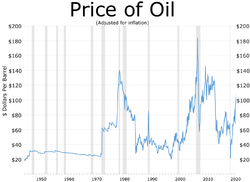Finance:1976 UK sterling crisis
The 1976 UK Sterling Crisis was a balance of payments or currency crisis in the United Kingdom in 1976 which caused James Callaghan's Labour government to borrow $3.9 billion ($17.5 billion in 2019)[1] from the International Monetary Fund (IMF),[2] with the intention of maintaining the value of the pound.[3] At the time this was the largest loan ever to have been requested from the IMF.[4] Inflation hit close to 25% in 1975, causing high bond yields and borrowing costs, and the 1973 oil crisis were contributors to the problem.[5]
History
The crisis took place during James Callaghan's term as Prime Minister,[6] and caused the Bank of England to withdraw temporarily from the foreign exchange market.[7] After the defeat of the public expenditure white paper in the House of Commons in March 1976 and the resignation of Harold Wilson, many investors became convinced the pound would soon lose value due to inflation. By June 1976, the pound had reached a record low against the dollar.[4]
Outcome
Only half of the loan was actually drawn by the UK government and it was repaid by 4 May 1979.[8] Denis Healey, the Chancellor of the Exchequer at the time, went on to state that the main reason the loan had to be requested was that public sector borrowing requirement figures provided by the treasury were grossly overstated.[9] Despite this all terms required by the IMF were fully implemented.
The IMF loan meant that the United Kingdom's economy could be stabilised whilst drastic budget cuts were implemented. Despite the security provided by the loan, the Labour Party had already begun separating into social democrat and left-wing camps, causing bitter rows inside the party and with the unions. Some believe this may have contributed significantly to Margaret Thatcher's 1979 Conservative victory.[10]
See also
- Winter of discontent
- Pound sterling
References
- ↑ Federal Reserve Bank of Minneapolis. "Consumer Price Index (estimate) 1800–". https://www.minneapolisfed.org/about-us/monetary-policy/inflation-calculator/consumer-price-index-1800-.
- ↑ "National Archives". http://www.nationalarchives.gov.uk/cabinetpapers/themes/imf-crisis.htm.
- ↑ "UK – IMF Crisis of 1976". https://www.economicshelp.org/blog/132993/economics/uk-imf-crisis-of-1976/.
- ↑ 4.0 4.1 "Sterling devalued and the IMF loan". http://www.nationalarchives.gov.uk/cabinetpapers/themes/sterling-devalued-imf-loan.htm.
- ↑ https://www.economicshelp.org/blog/132993/economics/uk-imf-crisis-of-1976/
- ↑ "BBC On This Day". 5 April 1976. http://news.bbc.co.uk/onthisday/hi/dates/stories/april/5/newsid_4074000/4074428.stm.
- ↑ Rogers, Chris (2009). The Politics of Economic Policy Making in Britain: A Re - assessment of the 1976 IMF Crisis. University of Warwick. pp. 17. http://wrap.warwick.ac.uk/4323/1/WRAP_Rogers_100211-the_politics_of_economic_policy_making_in_britain_pp_26-6-2009.pdf. Retrieved 17 December 2015.
- ↑ Denis, Healey (1990). The Time of my Life. Penguin. pp. 432. ISBN 978-1842751541.
- ↑ Moran, Joe (4 September 2010). "Defining Moment: Denis Healey agrees to the demands of the IMF". Financial Times. https://www.ft.com/content/11484844-b565-11df-9af8-00144feabdc0.
- ↑ "1976 government papers". 29 December 2006. http://news.bbc.co.uk/1/hi/uk_politics/6212557.stm.
Further reading
- Burk, Kathleen. "1976 IMF Crisis." (1989): 39-45.
- Ludlam, Steve. "The gnomes of Washington: Four myths of the 1976 IMF crisis." Political Studies 40.4 (1992): 713-727.
- Wass, Douglas. Decline to Fall: The Making of British Macro-economic Policy and the 1976 IMF Crisis. Oxford University Press, 2008.
- Kevin Hickson (13 May 2005). The IMF Crisis of 1976 and British Politics: Keynesian Social Democracy, Monetarism and Economic Liberalism: the 1970s Struggle in British Politics. I.B.Tauris. pp. 14–. ISBN 978-1-85043-725-3. https://books.google.com/books?id=kstOuQ0qJoEC&pg=PA14.
- Kathleen Burk; Alec Cairncross (1992). Good-bye, Great Britain: The 1976 IMF Crisis. Yale University Press. ISBN 0-300-05728-8. https://books.google.com/books?id=YamJGlX2_vkC.
- Mark D. Harmon (1997). The British Labour Government and the 1976 IMF Crisis. Macmillan. ISBN 978-0-333-67818-3. https://books.google.com/books?id=NhJtQgAACAAJ.





